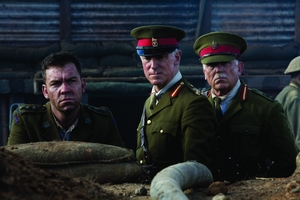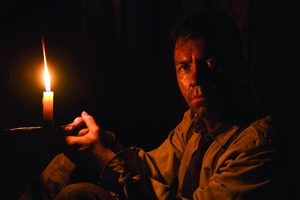Mark:
When it comes to great stories about heroic Aussie soldiers in the First World War, there aren’t many that can top that of Beneath Hill 60. David Roach’s screenplay is based on Captain Oliver Woodward’s diaries of his time in charge of a group of tunnellers in France and Belgium in 1916, and their task of undermining and destroying entrenched German positions from beneath.
When Oliver Woodward (Brendan Cowell) hears that the Armed Forces are recruiting men with mining and engineering backgrounds for a special task, he doesn’t hesitate to sign up and ship off to France. He leaves behind a young woman he is determined to marry on his return home, and meets up with the 1st Australian Tunnelling Company, who have been digging passages under enemy lines. After early success, Woodward and his men are charged with destroying a German machinegun post on Hill 60 in Belgium, a notorious battleground with a reputation for massive loss of Allied life.
He leaves behind a young woman he is determined to marry on his return home, and meets up with the 1st Australian Tunnelling Company, who have been digging passages under enemy lines. After early success, Woodward and his men are charged with destroying a German machinegun post on Hill 60 in Belgium, a notorious battleground with a reputation for massive loss of Allied life.
The most striking and successful aspect of Beneath Hill 60 is the production design and cinematography that brings the experiences of the tunnellers to life. The claustrophobia of being at war in such confined spaces is amplified by the danger of imminent discovery by Germans tunnelling in the opposite direction, or from collapse and suffocation under piles of dirt and rubble. The film succeeds in conveying this tension incredibly well, and much of the enjoyment of watching the film comes as a result.
It is in the above-ground action that Beneath Hill 60 waivers, predominantly in the flashback sequences that detail Woodward’s life just prior to volunteering for war. These flashbacks seem to break down the tension and lessen the effect of the film: while sometimes an intense and claustrophobic thriller will benefit from the pressure valve being released momentarily, in this film the result is unfortunately the opposite. Additionally, some of the war sequences are staged in such a way that most audience members should be able to predict the outcome for various characters, and this is a shame as the production design deserves better.
Beneath Hill 60 is also diminished by its reliance on the stereotypical portrayal of the British as pompous buffoons who should be grateful for Australian assistance, and Australian officers as being incompetent and callous. Chris Haywood’s turn as Colonel Wilson Rutledge, for example, borders on the ridiculous, and his scenes are some of the film’s weakest. One has to wonder what it is about our culture that we must sink the boot into our Allies every opportunity we get, with Australian war films almost invariably making out our soldiers to be the greatest warriors the world has known, and all others to be bungling goons. It seems hard to believe this is the entire truth of the matter.
Although rife with ANZAC cliches and betrayed by an unfortunate reliance on making others look silly to make our own look good, Beneath Hill 60 achieves its aim of bringing attention to the role of Australian tunnellers in the First World War, and the incredible (and incredibly dangerous) conditions they were forced to endure. That this viewer wants to read more of the actions of these men and the attack on Hill 60 should be recommendation enough.
Rating:
 I was in two minds about Cezary Skubiszewski’s score. It is at times brilliant – the grand, sweeping tunes perfectly accentuate the film’s best moments – but once or twice it was actually distracting.
I was in two minds about Cezary Skubiszewski’s score. It is at times brilliant – the grand, sweeping tunes perfectly accentuate the film’s best moments – but once or twice it was actually distracting.